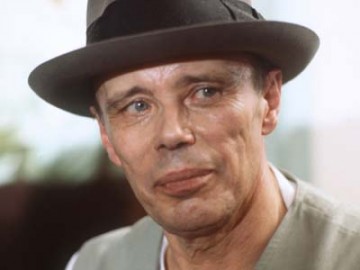
Originally published in the Northside San Francisco in February 2010
To make people free is the aim of art, therefore art for me is the science of freedom. —Joseph Beuys
Through June 2010, The Los Angeles County Museum of Art will be exhibiting a rare collection of more than 500 multiples from the legendary artist Joseph Beuys. The presentation takes place on the third floor of the new Eli Broad wing as part of the ongoing loan established between LACMA and the Broad Art Foundation.
Often called the most influential post-war European artist, Joseph Beuys became known for art that presented the symbols of his own life in deeply subconscious drawings, sculptures and found objects. He also became one of the earliest practitioners of performance art, putting on “actions” as he called them. Profoundly personal and political, his “actions” often provoked such an extreme response in the audience that he was once punched in the nose and, bloodied, continued his performance. Later, a Beuys action resulted in his dismissal from the school where he was an instructor.
Born in 1921 in Krefeld, Germany, Beuys became a member of the Hitler youth at age nineteen when he joined the Luftwaffe. After his plane was shot down, Beuys became a Britishprisoner of war. When he eventually returned to a conquered Germany, Beuys started creating work that acted as a shamanic exorcism of what he called “the wound”, the damage that the Nazi regime caused to the world and the German population in particular, and the subsequent need to grieve this tragedy.
Beuys’s multiples consist of two and three dimensional objects issued in editions. His media included felt, animal fat, wood, found objects and other organic materials used as paint. Felt and animal fat in particular had a life-affirming association for Beuys: when his plane was shot down over the Crimean front, he claims to have been rescued by nomadic Tartar tribesman who wrapped him in animal fat and felt to warm and heal his damaged body. Always a keen student of the natural world, the theme of nature and environmentalism was key in his famous action in 1974, “I like America and America Likes Me”. The event occurred at the Rene Block Gallery in New York City but actually began at the Kennedy Airport where Beuys was wrapped in felt and shipped to the Gallery. During the performance, he spent several days confined to a room with a live coyote. The coyote was a symbol of an unspoiled pre -industrial America, and was also a spiritually meaningful animal in Native American traditions.
Joseph Beuys considered his role as an educator to be his greatest work of art. He was appointed as a professor of sculpture at the Kunstakademie Dusseldorf in 1961. During his tenure, he ignored entry requirements which caused institutional animosity. This animosity culminated in his termination, which became an art event in of itself. Students protested and staged a sit-in in Beuys’s classroom, ending when he exited the school surrounded by police officers. The resulting photo of Beuys, laughing surrounded by less than amused policemen, became a famous photo called “Democracy is merry”.
Felt suits, tin cans and abstract drawings might leave the viewer wondering “why is this art?” The work of Joseph Beuys falls apart under scrutiny outside the context of his personal story. Each object exists as an expression of a particular experience. Beuys’s art is a personal language of moments. He was once quoted as saying that “… even the act of peeling a potato can be considered art if it is a conscious act. Everyone is an artist”.